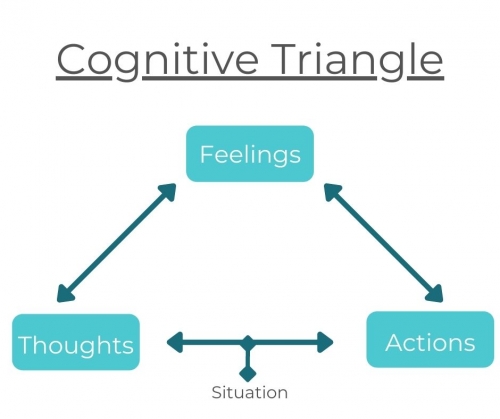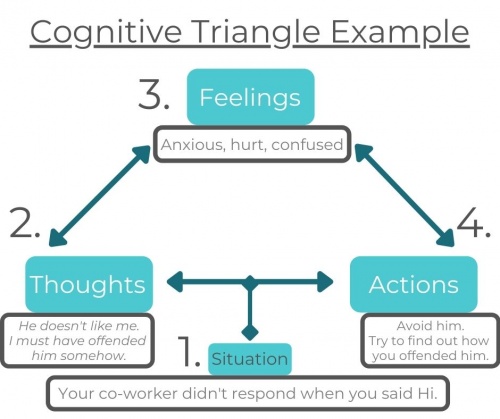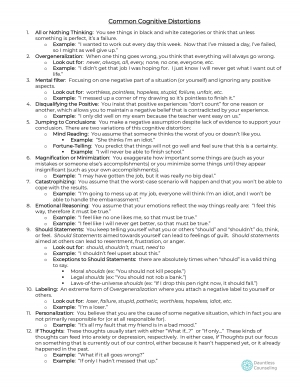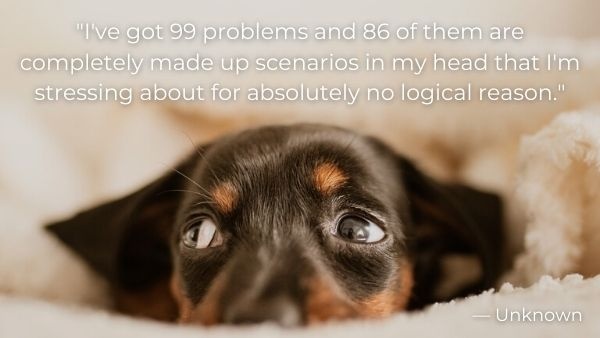Your thoughts can play a big role in how you feel, what you do, and how your day goes. So let’s talk about thoughts.

Why Do Thoughts Matter in the First Place?
Whatever situation you are dealing with, you are obviously going to have thoughts about it. But let’s look at the impact that unhelpful thoughts can have with an example.
Let’s say you’re walking down the hallway at work, and you walk past Bob. You and Bob aren’t close, but you remember him from that meeting last week, so you decide to say, “Hey!”
But Bob doesn’t respond. No smile, no wave, no “Hey” back, nothing. He just keeps walking.
You might think all kinds of thoughts about why Bob didn’t respond. For instance…
- Bob must not like me. I wonder if I said something earlier that upset him.
- That guy is such a jerk for ignoring me.
- Maybe he’s having a bad day and he’s stuck in his own head.
- He probably just didn’t hear me.
If your brain jumped to the first thought, then you might feel anxious or embarrassed. You might try to avoid running into him, or maybe try to figure out what you said before to upset him.
But if you jumped to the conclusion that he ignored you because he’s a jerk, you’re probably feeling kind of annoyed. And you’re definitely not going to go out of your way to talk to him in the future, but only because he’s not worth your time.
If you thought he might be having a hard time, however, you might feel sympathetic towards Bob and make a point to smile at him later and ask him, “How’s it going?”
If you assumed that he just didn’t year you, you probably wouldn’t have any sort of strong feelings about the situation and just go about your day. The next time you saw Bob, you might say “Hey,” again. Maybe a little louder this time.
The Cognitive Triangle
Your thoughts affect your feelings, your feelings affect your actions, your actions affect the situations you’re in, and then you have more thoughts about those situations. This loop is called the Cognitive Triangle:

Using one of the examples from above, the cognitive triangle might look like this:

Your ideas about yourself, the world, and how other people tend to behave can color your perceptions of specific situations, such as why Bob didn’t respond. You can see how your interpretation of the situation can drastically change your feelings about it, as well as how you decide to act moving forward.
How you respond can also change the situation itself. For example, if you decide to ignore Bob from now on, he’s probably not going to become your new work buddy.
Most of the time, the first thoughts that you have will simply pop into your head. You don’t decide to think that Bob is a jerk or worry if you offended him, these thoughts just show up.
In this case, these unhelpful thoughts might be called Negative Automatic Thoughts, or NATs for short. You can think of NATs like gnats: you don’t ask for them, they buzz around your head, and they don’t generally put you in a good mood.
Knowing about the relationship between our thoughts, feelings, and actions can be a powerful thing, because our emotions don’t exactly come with a remote control. If you want to change how you are feeling, then it can be powerful to respond to unhelpful thoughts differently.
But first, it can be helpful to know what you’re looking for.

Kinds of Unhelpful Thoughts to Look Out For
Your brain is designed to think. All of the time. Which means that over the course of a day, you are going to have a lot of thoughts. And just by sheer probability, some of those thoughts are going to be helpful and some of them may be not so helpful.
It can be useful to think of thoughts like email. Some emails are useful and give us important information or help us accomplish something. Some emails have fun content that you enjoy. But the majority of the email you get is just junk. And you can give the unhelpful thoughts in your brain just as much value and importance as you give the junk email in your inbox: none.
Often these junk thoughts are distorted in some way that is not helpful, and generally not true (or not entirely true). We call these cognitive distortions.
I once had a patient accidentally refer to them as cognitive contortions, and they were not wrong! Cognitive distortions often have the truth all twisted up.
Types of cognitive distortions to look out for:
- All or Nothing Thinking: You see things in black and white categories or think that unless something is perfect, it’s a failure.
- Example: “I wanted to work out every day this week. Now that I’ve missed a day, I’ve failed, so I might as well give up.”
- Overgeneralization: When one thing goes wrong, you think that everything will always go wrong.
- Look out for: never, always, all, every, none, no one, everyone, etc.
- Example: “I didn’t get that job I was hoping for. I just know I will never get what I want out of life.”
- Mental filter: Focusing on one negative part of a situation (or yourself) and ignoring any positive aspects.
- Look out for: worthless, pointless, hopeless, stupid, failure, unfair, etc.
- Example: “I messed up a corner of my drawing so it’s pointless to finish it.”
- Disqualifying the Positive: You insist that positive experiences “don’t count” for one reason or another, which allows you to maintain a negative belief that is contradicted by your experience.
- Example: “I only did well on my exam because the teacher went easy on us.”
- Jumping to Conclusions: You make a negative assumption despite lack of evidence to support your conclusion. There are two variations of this cognitive distortion:
- Mind Reading: You assume that someone thinks the worst of you or doesn’t like you.
- Example: “She thinks I’m an idiot.”
- Fortune-Telling: You predict that things will not go well and feel sure that this is a certainty.
- Example: “I will never be able to finish school.”
- Mind Reading: You assume that someone thinks the worst of you or doesn’t like you.
- Magnification or Minimization: You exaggerate how important some things are (such as your mistakes or someone else’s accomplishments) or you minimize some things until they appear insignificant (such as your own accomplishments).
- Example: “She finished her project before me, so she must be better than me.”
- Example: “I may have gotten the job, but it was really no big deal.”
- Catastrophizing: You assume that the worst-case scenario will happen and that you won’t be able to cope with the results.
- Example: “I’m going to mess up at my job, everyone will think I’m an idiot, and I won’t be able to handle the embarrassment.”
- Emotional Reasoning: You assume that your emotions reflect the way things really are: “I feel this way, therefore it must be true.”
- Example: “I feel like no one likes me, so that must be true.”
- Example: “I feel like I will never get better, so that must be true.”
- Should Statements: You keep telling yourself what you or others “should” and “shouldn’t” do, think, or feel. Should Statements aimed towards yourself can lead to feelings of guilt. Should statements aimed at others can lead to resentment, frustration, or anger.
- Look out for: should, shouldn’t, must, need to
- Example: “I shouldn’t feel upset about this.”
- Example: “I need to be the best.”
- Exceptions to Should Statements: there are absolutely times when “should” is a valid thing to say.
- Moral shoulds (ex: “You should not kill people.”)
- Legal shoulds (ex: “You should not rob a bank.”)
- Laws-of-the-universe shoulds (ex: “If I drop this pen right now, it should fall to the floor.”)
- Labeling: An extreme form of Overgeneralization where you attach a negative label to yourself or others.
- Look out for: loser, failure, stupid, pathetic, worthless, hopeless, idiot, etc.
- Example: “I’m a loser.”
- Personalization: You believe that you are the cause of some negative situation, which in fact you are not primarily responsible for (or at all responsible for).
- Example: “It’s all my fault that my friend is in a bad mood.”
- If Thoughts: These thoughts usually start with either “What if…?” or “If only…” These kinds of thoughts can feed into anxiety or depression, respectively. In either case, If Thoughts put our focus on something that is currently out of our control, either because it hasn’t happened yet, or it already happened in the past.
- Example: “What if it all goes wrong?”
- Example: “If only I hadn’t messed that up.”
To download your free PDF of common cognitive distortions, click the image below.

Cognitive distortions often have some grain of truth to them that either gets magnified or focused on to the exclusion of all other facts. But whether or not there is any truth to these kinds of thoughts, they tend to just make us feel worse without any actual benefit.
One thing to keep in mind, is that having cognitive distortions is a human thing, we all have them sometimes. In fact, our brains even have a “Negativity Bias” hardwired into them. But the less importance you give these kinds of thoughts and the less you buy into them, the better you will feel.

So now that you know what kinds of unhelpful thoughts to look out for, how do you deal with them? Look out for my next article for some helpful strategies.
As a reminder, this blog post is not intended as professional counseling or clinical advice. This article is meant to provide individuals with a better understanding of the power of unhelpful thoughts and kinds of unhelpful thoughts to look out for. I encourage you to consider seeking help in person if you need additional support or are feeling overwhelmed by your anxiety or OCD.

-Kristel Roper, LMFT, LPCC
Kristel Roper is a licensed psychotherapist offering therapy services to individuals in the Sacramento area. She specializes in anxiety counseling and especially enjoys working with young adults as they navigate the challenges of college, career, and beyond. Learn more about Kristel Roper’s Therapy Services.
Photo by Jamie Brown on Unsplash
Photo by Dominika Roseclay on Pexels

Thanks for the sensible critique. Me and my neighbor were just preparing to do a little research on this. We got a grab a book from our local library but I think I learned more clear from this post. I am very glad to see such excellent information being shared freely out there.